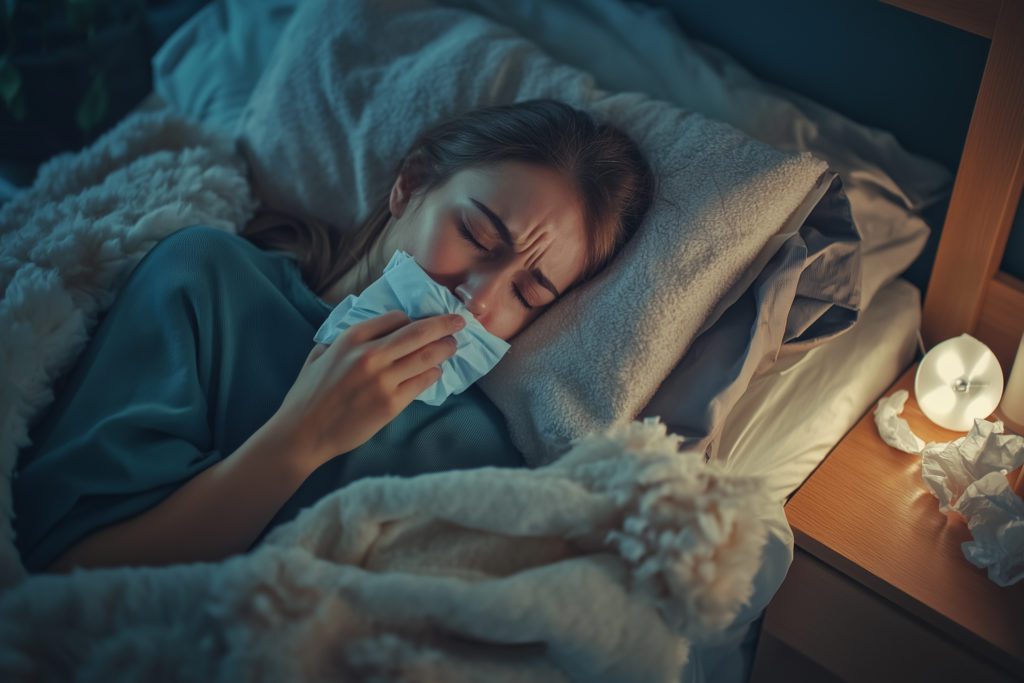
Can a Good Night's Sleep Boost Your Immune System? Exploring the Science
Could sleep be the key to boosting your immune system? Find out how to optimize your rest for stronger immunity.

Many of us would like to be healthier—getting sick is universally unpleasant, and if you could, you’d avoid it completely, right? Perhaps you take multivitamins to ward off bugs, and eat organic foods to give your body all the nutrients it needs to fight potential viruses.
But did you know that sometimes it’s simply a good night’s sleep your body needs? In our relentless quest for optimal health, the significance of sleep often takes a backseat. Yet, this fundamental pillar of wellness plays a crucial role in bolstering our immune system.
In this article, we’ll explore the relationship between sleep and the immune system, offering insights into how quality rest can strengthen our body's defenses against illnesses.
Understanding the Immune System
Our immune system acts as the body's defense force against invaders that may cause. infections and diseases—the bacteria, fungi, and virus that could cause bad things to happen to a healthy body.
The immune system is an intricate network involving white blood cells, antibodies, and other components, all working in harmony to protect us.
White blood cells are the frontline soldiers, identifying and attacking pathogens. Antibodies remember past invaders, so our body is more efficient in fighting them off next time they try to attack.
However, our immune system isn’t always effective—it can become weak due to smoking, alcohol, poor nutrition, viruses like HIV, and of course, lack of sleep.
Sleep's Effect on Immune Function
Quality sleep is a cornerstone of a robust immune system. It creates the perfect environment for a number of biological processes that enhance your body's defense mechanisms.
Production of Cytokine
During sleep, your body increases its production of cytokines, a type of protein that regulates immunity and inflammation. These proteins signal the immune system to fight off infections or reduce inflammation. They’re like a command center for deploying immune responses.
The deeper sleep stages, particularly slow-wave sleep (or N3 sleep), are thought to be critical periods when these proteins are most actively produced.
Enhancement of T Cells
T cells play a key role in the immune system's response to viral pathogens, with the ability to completely wipe out infected or cancerous cells. Sleep helps T cells stick to and attack infected cells.
During sleep, the body reduces the level of certain stress hormones, which may otherwise render our immune system less effective. This means the T cells can function more efficiently in combating those unwelcome invaders!
Production of Antibodies
As well as boosting the production of immune cells, sleep also enhances the body's ability to produce antibodies. These are clever proteins that recognize foreign pathogens such as viruses and bacteria, marking them for destruction.
When you get enough sleep, your body can create these antibodies more effectively and improve its memory response to pathogens it has encountered before.
Risks of Sleep Deprivation on Immunity
If you don’t get enough shut-eye, your immune system is at risk, meaning your body will be more vulnerable.
Increased Susceptibility to Colds and the Flu
Studies show that people who don't get quality sleep or enough sleep are more likely to get sick after being exposed to a virus, such as a common cold virus.
One landmark study found that people who slept less than seven hours per night were almost three times more likely to develop a cold than those who slept eight hours or more. This is because sleep deprivation impairs the body's natural defenses, including its fever response, which is crucial for fighting off these types of infections.
Chronic Inflammation and Long-Term Health Risks
Beyond acute infections, sleep deprivation is associated with heightened levels of inflammation in the body. Chronic inflammation is a known risk factor for a host of diseases, including heart disease, diabetes, and cancer.
By disrupting the balance of pro-inflammatory and anti-inflammatory cytokines, not sleeping enough means these chronic conditions develop and progress more readily.
Impact on Vaccine Effectiveness
Emerging research suggests that sleep also plays a vital role in how well the body responds to vaccinations. Adequate sleep around the time of vaccination has been shown to enhance the body's immune response, leading to higher antibody production and a more robust defense against the targeted disease.
Conversely, sleep deprivation can weaken the vaccine's effectiveness, demonstrating the critical role sleep plays in adaptive immunity.
How Much Sleep Do We Really Need?
- Most adults need 7-9 hours’ sleep per 24-hour period
- Some adults can be healthy and happy with 6 hours per night, while others may need up to 10
- Pregnant women need several hours more sleep during the first trimester
- People aged 65+ only need 7-8 hours on average per night
Paying attention to how you feel on different amounts of sleep can guide you to your ideal sleep duration, optimizing your immune system boost.
Tips for Enhancing Sleep Quality
If you’re not sure if your sleep is long enough—or of a high enough standard—to keep your immune system ticking along nicely,
Establish a Sleep Routine
It’s recommended you go to bed (and wake up) at the same time every day to synchronize your body's clock, leading to better sleep hygiene. Doing something relaxing before bed, such as gentle stretching or taking a bath, is also a great idea.
Create a Restful Environment
Is your bedroom conducive to sleep? Make sure it’s cool, quiet, and dark enough for your body to fall into a deep slumber with no disturbances. A quality mattress and pillows are also important so that you’re comfortable until morning.
Make Necessary Lifestyle Adjustments
Try to avoid consuming caffeine and heavy, spicy, or oily foods close to bedtime. If you can work out regularly to improve your sleep quality (but avoid high-intensity workouts close to bedtime).
FAQ
Can napping compensate for poor nighttime sleep when it comes to immunity?
Short naps (20–30 minutes) can provide a temporary immune boost, but they don’t fully replace the deep, restorative sleep needed for optimal immune function. Consistently missing out on full sleep cycles at night can still weaken immune defenses over time.
What sleep disorders might weaken the immune system?
Conditions like insomnia, sleep apnea, and restless leg syndrome can lead to chronic sleep deprivation, reducing immune efficiency and increasing inflammation. Seeking treatment for these disorders can help improve immune resilience.
Is there an ideal bedtime for maximizing immune function?
Research suggests that going to bed before midnight aligns better with the body's natural circadian rhythms, promoting more restorative sleep and stronger immune function. Consistency in sleep timing is also key.
Does sleeping too much have negative effects on immunity?
While sleep is essential for immune health, excessive sleep (over 9–10 hours regularly) can be linked to underlying health issues like chronic inflammation, depression, or metabolic disorders, which may also impact immunity.
Can sleeping in on weekends help restore immune function?
While catching up on lost sleep can be beneficial, it’s not a perfect fix. Irregular sleep patterns can disrupt circadian rhythms, making it harder to maintain a consistently strong immune response.

Written by
Georgia Austin
Professionally trained copywriter, editor, and content marketing strategist with over 7 years of experience—working with brands like Nike, Siemens, Toshiba, Tommy Hilfiger, Culture Trip, and Klook.
Download Pillow
Get help
Press & News
Legal
Connect
X (Twitter)
Company
Copyright © Neybox Digital Ltd.



